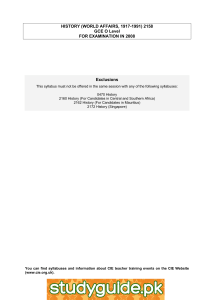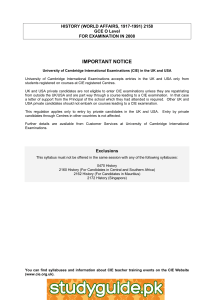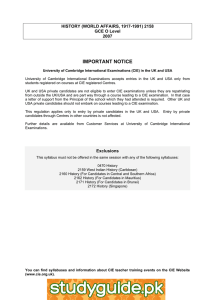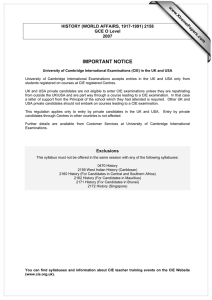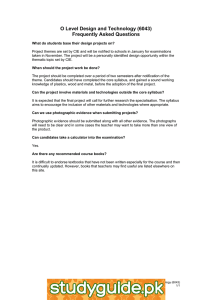IMPORTANT NOTICE www.XtremePapers.com HISTORY (WORLD AFFAIRS, 1917-1991) 2158 GCE O Level
advertisement
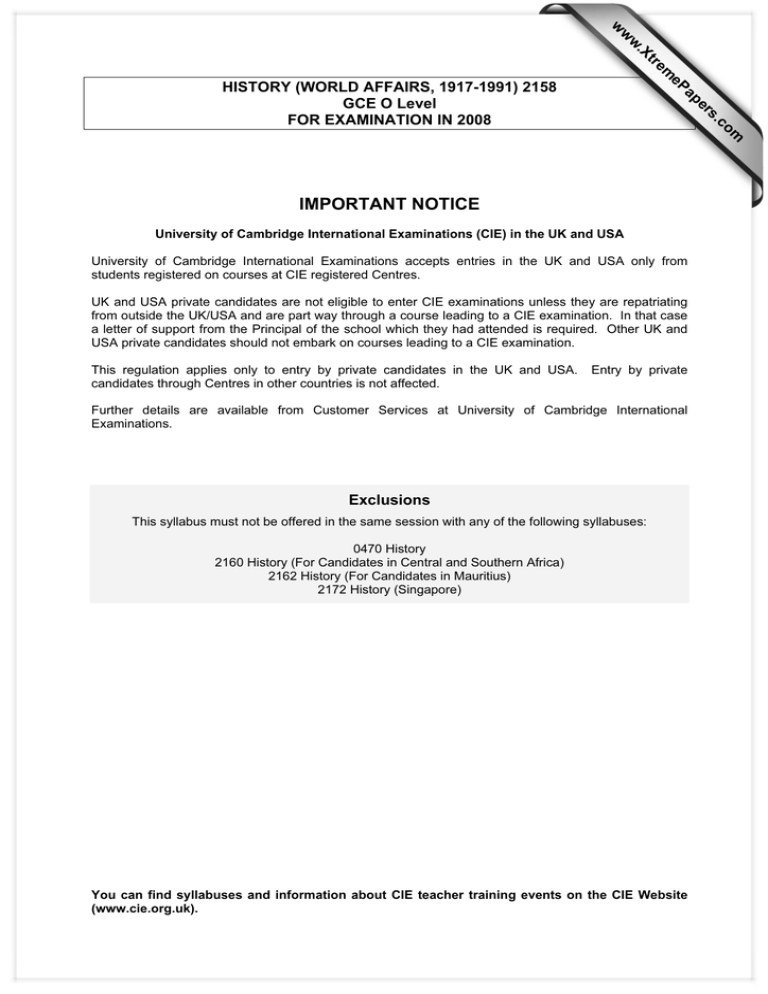
w w m e tr .X w ap eP HISTORY (WORLD AFFAIRS, 1917-1991) 2158 GCE O Level FOR EXAMINATION IN 2008 om .c s er IMPORTANT NOTICE University of Cambridge International Examinations (CIE) in the UK and USA University of Cambridge International Examinations accepts entries in the UK and USA only from students registered on courses at CIE registered Centres. UK and USA private candidates are not eligible to enter CIE examinations unless they are repatriating from outside the UK/USA and are part way through a course leading to a CIE examination. In that case a letter of support from the Principal of the school which they had attended is required. Other UK and USA private candidates should not embark on courses leading to a CIE examination. This regulation applies only to entry by private candidates in the UK and USA. candidates through Centres in other countries is not affected. Entry by private Further details are available from Customer Services at University of Cambridge International Examinations. Exclusions This syllabus must not be offered in the same session with any of the following syllabuses: 0470 History 2160 History (For Candidates in Central and Southern Africa) 2162 History (For Candidates in Mauritius) 2172 History (Singapore) You can find syllabuses and information about CIE teacher training events on the CIE Website (www.cie.org.uk). HISTORY (WORLD AFFAIRS, 1917-1991) 2158 O LEVEL 2008 HISTORY WORLD AFFAIRS, 1917-1991 GCE Ordinary Level Syllabus 2158 2008 Copies of syllabuses, past papers and Examiners’ Reports are available on CD ROM and can be ordered using the Publications Catalogue, which is available at www.cie.org.uk under ‘Qualifications & Diplomas’ – ‘Order Publications’. AIMS AND OBJECTIVES The aims of an ‘O’ Level History syllabus are: 1. to stimulate interest in and enthusiasm for the study of the past; 2. to promote the acquisition of knowledge and understanding of human activity in the past, linking it, as appropriate, with the present; 3. to help pupils towards an understanding of the development over time of social and cultural values; 4. to promote the understanding of basic historical concepts, such as cause and consequence, continuity and change; 5. to encourage the development of literacy and essential study skills; 6. to provide a sound basis for further study and the pursuit of personal interest. The objectives of the examination are to test candidates' proficiency in the following skills: 1. the recall of relevant factual knowledge; 2. the deployment of knowledge in a relevant and coherent manner; 3. the understanding of basic historical concepts such as cause and consequence, continuity and change; 4. the ability to use factual knowledge and concepts to demonstrate an understanding of a historical period by analysing or explaining particular questions. These objectives are closely interrelated and no attempt is made to allocate precise mark weightings to each. However, higher grades will not be awarded on the basis of objective 1 alone. 1 HISTORY (WORLD AFFAIRS, 1917-1991) 2158 O LEVEL 2008 This subject will be available in June and November. The examination will consist of one paper of 2½ hours. There will be six questions in Section A and five questions in each of Sections B-F. Candidates will be required to answer five questions. At least one question must be answered from Section A, and questions from at least two of Sections B-F. Questions will be structured into two parts. The first part will require description or narrative and will carry 14 marks. The last part will require analysis or interpretation and will carry 6 marks. Candidates will not be expected to present material on events after 1991. Syllabus Section A: International Relations and Developments The 1919-20 peace settlement; international relations in the 1920s. The structure and work of the League of Nations. The causes, course and consequences of the Second World War. The structure and work of the United Nations Organisation. The development of the Cold War; coexistence and détente. Military conflict in Korea and Vietnam. World economic and social issues, e.g. disarmament, ecology, energy, population and poverty. Section B: Western Europe The internal history and foreign relations of Italy and Germany between the wars. Salient features in the internal history and foreign relations of Britain during the twentieth century. The causes and course of the Spanish Civil War. The Second World War in Western Europe and the Mediterranean. The internal history and foreign relations of France and Germany since the Second World War. The development of closer economic and political union in Western Europe since the Second World War. Section C: The Americas Issues in US foreign relations from 1917 to 1945. Economic, social and political developments within the United States during the 1920s. The nature and impact within the United States of the Great Crash and of the New Deal. Domestic and foreign policy issues under US presidents since the Second World War. Social and political issues within the United States since the Second World War, e.g. McCarthyism, race relations, rights of women and students, and Watergate. Salient features in the internal history and foreign relations during the twentieth century of Argentina, Brazil, Chile and Cuba. 2 HISTORY (WORLD AFFAIRS, 1917-1991) 2158 O LEVEL 2008 Section D: The Soviet Union and Eastern Europe Events within Russia in 1917; the Russian Civil War; the government of Lenin. The rise to power of Stalin; the nature of his economic and totalitarian control within the Soviet Union. Issues in Soviet foreign relations from 1917 to 1941. The Second World War in the Soviet Union and Eastern Europe. The establishment of a Soviet presence in Eastern Europe; challenges to it in Yugoslavia, Poland, Hungary and Czechoslovakia; its eventual collapse. The internal history and foreign relations of the Soviet Union under Khrushchev, Brezhnev and Gorbachev. Section E: Africa and the Middle East Consequences of the First World War for the Ottoman Empire; the rule of Kemal Ataturk. The British mandate of Palestine; the creation of Israel; Arab-Israeli relations from 1948. The internal history and foreign relations of Egypt since the Second World War; the Suez crisis and its international dimension. The causes, course and consequences of civil war in the former Belgian Congo and in Nigeria. Independence and the later internal history of salient British and French colonies in Africa. South Africa and the apartheid system; international implications and eventual abandonment of apartheid. Section F: Asia Conflict and developments within China to 1949. Economic, social and political issues within China from 1949; foreign relations in these years. The expansion, defeat and occupation of Japan; its economic and political recovery. The Indian sub-continent under British rule; independence and partition; the internal history and foreign relations of India and Pakistan since independence. Malaya and the Dutch East Indies; independence as Malaysia and Indonesia; domestic and foreign issues since independence. 3
